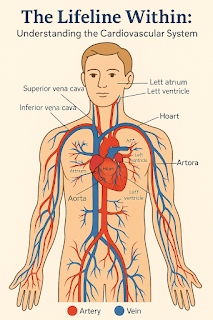The human body is an intricate masterpiece, and at the core of its functionality lies the cardiovascular system—a dynamic network responsible for sustaining life. Comprising the heart, blood vessels, and blood, this system tirelessly works behind the scenes, ensuring that oxygen, nutrients, and waste are efficiently transported throughout the body. Let’s dive into the fascinating world of the cardiovascular system and discover what makes it so vital to our survival.
The Core Functions of the Cardiovascular System
-
Circulation:
The cardiovascular system’s primary mission is to circulate blood throughout the body. This continuous flow delivers oxygen and nutrients to tissues and organs while also transporting waste products, such as carbon dioxide, for disposal. -
Nutrient and Hormone Delivery:
Beyond oxygen, blood also carries essential nutrients, hormones, and other substances that are crucial for the proper functioning of every cell and organ. -
Waste Removal:
Metabolic waste products are picked up from cells and carried to organs like the lungs, kidneys, and liver for elimination. -
Body Temperature Regulation:
The cardiovascular system helps regulate body temperature by distributing heat generated by muscles and organs. -
Immune Support:
White blood cells and other components within the blood are key players in the body’s immune defense, helping fight off infections and diseases.
Main Components of the Cardiovascular System
-
Heart:
Often described as the body’s engine, the heart is a powerful muscular pump that propels blood throughout the body. -
Blood Vessels:
A complex network that includes:-
Arteries – Carry oxygen-rich blood away from the heart.
-
Veins – Return oxygen-poor blood back to the heart.
-
Capillaries – Microscopic vessels where nutrient and gas exchange occurs between blood and body tissues.
-
-
Blood:
The life-sustaining fluid composed of red blood cells, white blood cells, platelets, and plasma, responsible for carrying oxygen, nutrients, hormones, and waste.
Fascinating Facts About the Cardiovascular System
-
Extensive Reach:
If you could lay out all the blood vessels in a human body, they would stretch over 60,000 miles (96,000 kilometers)—enough to circle the Earth more than twice! -
Heartbeat Count:
Your heart beats more than 100,000 times a day, continuously working without rest. -
Blood Volume:
An average adult contains around 5 to 6 quarts (4.7 to 5.7 liters) of blood circulating throughout their body. -
Size and Weight of the Heart:
Roughly the size of a fist, the average heart weighs between 300 and 450 grams. -
Built-In Electrical System:
The heart has a natural electrical conduction system that regulates the rhythm and timing of each heartbeat. -
Leading Health Concern:
Heart disease remains one of the leading causes of death worldwide, emphasizing the importance of cardiovascular health and awareness.
The cardiovascular system is a remarkable and efficient life-support system. From delivering oxygen to powering the immune response, it plays a role in almost every biological function. Understanding how it works not only deepens our appreciation of the human body but also underscores the importance of maintaining a heart-healthy lifestyle through regular exercise, balanced nutrition, and routine health checkups.
For Enquiries: cardiologysupport@





No comments:
Post a Comment